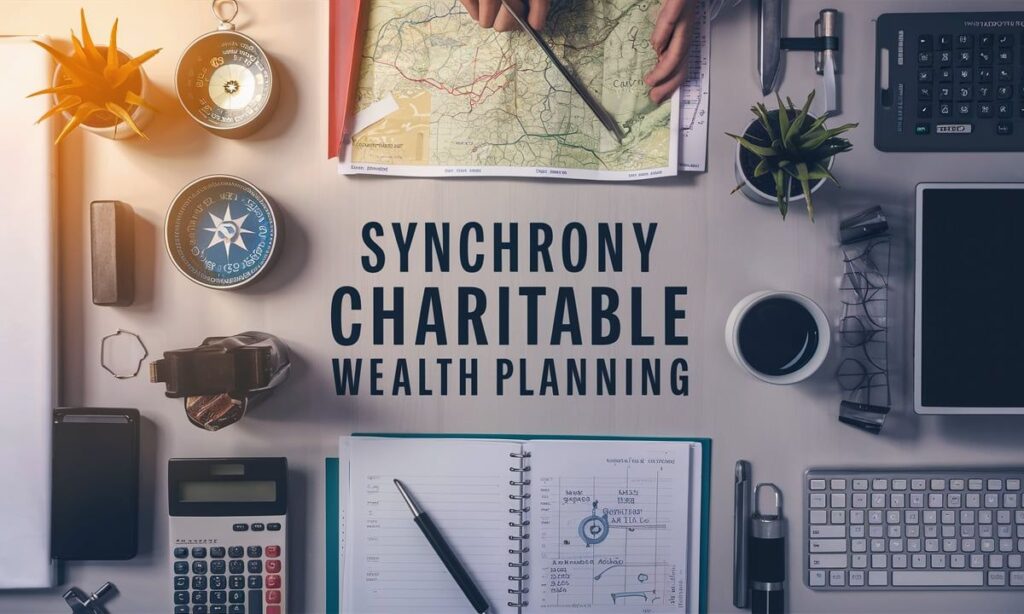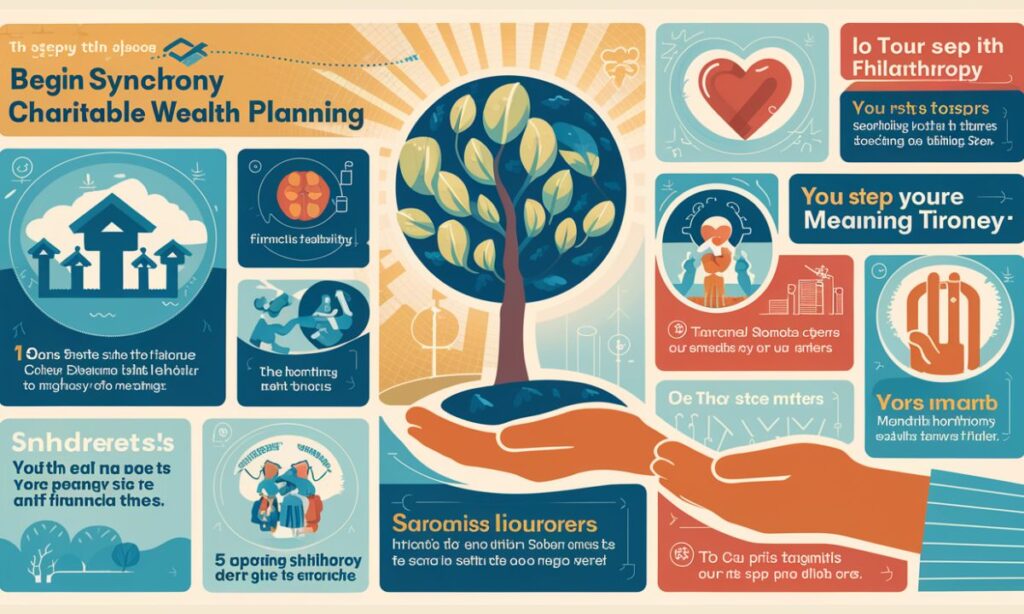Charitable giving is an essential way to make a difference in the world. Synchrony Charitable Wealth Planning provides a structured approach to philanthropy that not only supports meaningful causes but also aligns with personal financial goals.
By leveraging wealth management tools, individuals can maximize their contributions while reaping tax benefits, creating a lasting impact on the causes they care about.
What is Synchrony Charitable Wealth Planning?
Synchrony Charitable Wealth Planning is a strategy designed to help individuals balance philanthropy and financial management. It incorporates charitable giving strategies to ensure that contributions are impactful and aligned with the donor’s values.
By using tools like Charitable Trusts, Donor-Advised Funds (DAFs), and Charitable Remainder Trusts (CRTs), donors can optimize their giving for both the causes they support and their personal finances.
This approach allows donors to:
- Save on taxes through deductions and exemptions.
- Support charitable causes in a sustainable manner.
- Plan donations to reflect their long-term financial goals.
With Synchrony Charitable Wealth Planning, individuals can engage in philanthropic financial planning that makes their giving more effective and meaningful.
How Does Synchrony Charitable Wealth Planning Work?
To begin with Synchrony Charitable Wealth Planning, individuals typically work with financial advisors for philanthropy who specialize in wealth management for donations. These advisors guide donors in selecting the most appropriate tools and strategies for their unique circumstances.
read also:Immediate X3 Proair: Guide to Enhanced Respiratory Health
Common Tools Used in Synchrony Charitable Wealth Planning

- Charitable Trusts
- These are legal arrangements where assets are placed in a trust, allowing donors to enjoy financial benefits while contributing to charities.
- Advantages: Tax savings, income generation, and ensuring the assets are used for charitable purposes.
- Donor-Advised Funds (DAFs)
- A DAF allows individuals to contribute to a fund and recommend grants to their chosen charities over time.
- Benefits: Immediate tax deductions, flexibility in giving, and simplified record-keeping.
- Charitable Remainder Trusts (CRTs)
- CRTs enable donors to receive income from their assets during their lifetime. Afterward, the remaining assets go to the designated charity.
- Key Feature: Combines income generation with legacy planning.
- Gifting Appreciated Assets
- Donors can give stocks, real estate, or other assets that have appreciated in value.
- Benefit: Avoid capital gains tax while supporting charitable causes.
The table below summarizes these tools:
| Tool | Description | Key Benefits |
| Charitable Trusts | Assets placed in a legal trust | Tax savings, income generation |
| Donor-Advised Funds | Fund for recommending grants | Flexibility, tax efficiency |
| Charitable Remainder Trusts | Income for life, remainder to charity | Legacy planning, tax savings |
| Gifting Appreciated Assets | Donating high-value assets | Avoids capital gains tax |
Benefits of Synchrony Charitable Wealth Planning
- Tax Savings with Donations
- Charitable contributions can significantly reduce taxable income. Tools like CRTs and DAFs offer additional tax advantages.
- For example, donating appreciated stocks allows donors to avoid taxes on the asset’s increased value.
- Creating a Lasting Charitable Legacy
- Through mechanisms like CRTs, donors can ensure their contributions continue to make an impact even after their lifetime.
- Legacy planning through donations reflects personal values and priorities.
- Flexible Donation Planning
- Tools like DAFs offer flexibility, allowing donors to distribute funds to various charities over time rather than all at once.
- Aligning with Charity-Focused Financial Goals
- Synchrony Charitable Wealth Planning ensures that donations align with long-term financial plans, supporting both personal and philanthropic objectives.
- Philanthropic Financial Planning for Impact
- Comprehensive planning ensures that every dollar donated achieves maximum impact, balancing generosity with financial security.
How to Get Started with Synchrony Charitable Wealth Planning

Getting started involves a few structured steps, guided by a knowledgeable financial advisor:
- Understand Your Financial Situation
- Evaluate your income, assets, and liabilities to determine how much you can allocate for charitable giving.
- Set Charitable Goals
- Identify the causes you care about, such as education, healthcare, or environmental protection.
- Decide whether you want to make one-time contributions or support charities over many years.
- Choose the Right Tools
- Based on your financial situation and goals, select from options like Charitable Trusts or DAFs.
- Collaborate with a Financial Advisor
- Advisors play a pivotal role in designing a tax-efficient, impactful giving plan.
- Start Donating
- Begin with either a lump-sum contribution or periodic donations, depending on your strategy.
The Role of Financial Advisors
Financial advisors are integral to charitable wealth management tools. Their expertise ensures that:
- Donations are legally and financially sound.
- Tax-saving opportunities are fully utilized.
- Charitable goals are met without compromising personal financial stability.
By leveraging their knowledge, donors can engage in estate planning with donations and achieve long-term giving solutions that benefit both themselves and the charities they support.
FAQs
What are the tax benefits of Synchrony Charitable Wealth Planning?
Charitable donations often reduce taxable income. Tools like DAFs and CRTs provide additional tax savings, such as avoiding capital gains taxes on appreciated assets.
How does a Donor-Advised Fund work?
A DAF allows donors to contribute to a fund, receive an immediate tax deduction, and recommend grants to charities over time. It offers flexibility and simplified management.
Can I receive income from my donations?
Yes, tools like Charitable Remainder Trusts allow donors to receive income during their lifetime, with the remaining funds going to charity.
What assets can I donate?
You can donate cash, stocks, real estate, or other appreciated assets. Donating appreciated assets can help avoid capital gains taxes.
How do I ensure my donations align with my values?
Work with a financial advisor to design a plan that reflects your charitable goals and supports causes that are meaningful to you.
Conclusion
Synchrony Charitable Wealth Planning offers a thoughtful approach to philanthropy by combining smart ways to give back with effective financial management.
Through tools like DAFs, CRTs, and charitable trusts, individuals can achieve their charity-focused financial goals while enjoying significant tax benefits.
By working with financial advisors, donors can ensure their contributions create a lasting impact, reflecting their values and priorities. Whether supporting education, healthcare, or environmental causes, Synchrony Charitable Wealth Planning empowers individuals to make a difference in the world while securing their financial future.
for more detalies visit Qavasaki.com

David is a seasoned SEO expert with a passion for content writing, keyword research, and web development. He combines technical expertise with creative strategies to deliver exceptional digital solutions.












